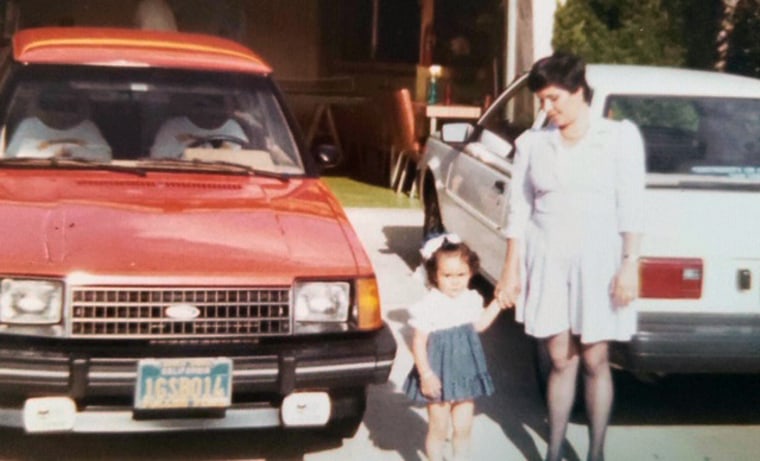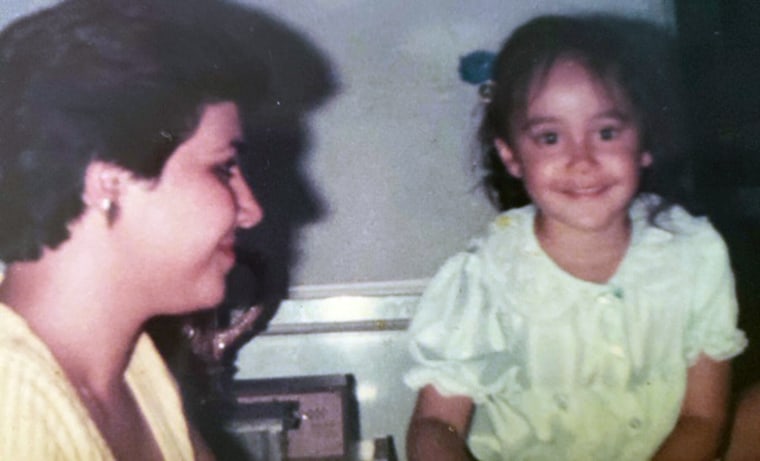Bertha Loaiza is on a mission to remove the shame around mental health issues, especially suicide, among fellow Latinos.
Her work stems from her own painful, personal journey.
Loaiza, now 37, was 3 when her mother carried her to the edge of California's San Diego-Coronado bridge and jumped with her in her arms.
Loaiza miraculously survived the 246-foot-plunge after a fisherman pulled her unconscious body from the water. Her mother, Angelica Medina, did not.

As a child, Loaiza didn't remember the incident, believing instead that she and her mom were in a car accident that gave her eye and leg injuries, and no one in her family corrected her.
But at 17, she discovered the truth while she was cleaning her house. Loiza found a tape that included a news story about a little girl who was recovering after her mother jumped off a bridge on Aug. 4, 1985.
“It was the worst feeling, because I always had some sort of guilt — I didn’t have any vivid memories of her,” Loaiza said. “I couldn’t remember the way she smelled, the way she laughed. So then I see this VHS and she was even more of a stranger to me.”
Loaiza was consumed by a torrent of questions: Why would her mom do that? Why hadn't anyone spoken about this? But at first, she didn’t mention her discovery to her family.
Mental health is a 'taboo' topic
That's not surprising, according to Luis Sandoval, a Los Angeles-based psychiatrist at Kaiser Permanente. Mental health is an especially “taboo” topic among Hispanics, he said.
As a result, he sees a "silent epidemic" that prevents many Latino families from seeking help.
Studies show that fewer than 1 in 11 Latinos contact mental health care specialists. Yet Sandoval says the stigma against mental illness is so pronounced that even when patients come to see him, their treatment is inhibited by their fear of how their condition will be received by family and friends.
Sandoval has had patients who stop taking their prescribed medicine after a few days under their family’s directives. Some patients keep their treatment a secret altogether to avoid judgment.
“We have a strong belief that how people see you is how they’re going to treat you," Sandoval said. "There’s no in-between; you’re normal or you’re loco, crazy. And you don’t want to be labeled as crazy.”
It's not just a fear of appearing insane, said Sandoval, but also a fear of appearing weak. A recent Kaiser Permanente survey revealed that 69 percent of Hispanic respondents believe that depression and/or anxiety are caused by a “personal weakness or failing.”
Sandoval thinks these attitudes may even be dissuading Latino doctors from entering the field of psychiatry when in fact there's a need for more Hispanics in the field.
There are about 57.5 million Hispanics in the U.S., yet only 1,373 psychiatrists in the country identified as Latino in 2010, according to the Association of American Medical Colleges’ most recent “Diversity in the Physician Workforce” report.
“Most families don’t encourage their children, in the Hispanic world, to go into the field of psychiatry — mostly because it’s not understood and we don’t talk about it,” Sandoval said.
Talking about the 'ugly stuff'
Over time Loaiza and her family began discussing the circumstances surrounding her mother's death. She learned that in addition to undergoing hormonal changes from her pregnancy, her mother, who immigrated to the United States from Mexico, was dealing with the stress of being in a new country.
She also learned how much her mother — who positioned herself so she took most of the impact as they fell from the bridge — loved her.
Sandoval believes a way to end the community's stigma around mental health is to make it a family issue.
“Once you educate the family and you demystify what it means to have mental health issues, then you get the family to understand that mental health is something that’s treatable,” Sandoval said.

“They learn how to help the person who’s there and what to say and what not to say," Sandoval said, "not to simplify it or tell them they should get over it and be stronger.”
If families are religious, patients may benefit from a reminder that “they’re made in the image and likeness of God,” Sandoval added.
Today, Loaiza is on the board of “Survivors of Suicide Loss,” a California-based organization that provides mental health trainings and runs 16 support groups for those who have lost loved ones throughout the state. Loaiza also co-facilitates the organization’s first bilingual group, recognizing that language barriers may be preventing some Latinos from getting help.
Loaiza works with Kaiser Permanente's and Story Corps' “Find Your Words” project. The website containing resources, including personal stories, for people struggling with depression as well as for their family and friends.
“I think it would be a dishonor to be found pulseless in the water and then given a chance to live this wonderful life that I’ve had and not do anything with it,” Loiza told NBC News.
“Let’s bring more awareness," she added. "It’s OK to talk about the ugly stuff because it could be a lot uglier if we don’t.”
FOLLOW NBC LATINO ON FACEBOOK, TWITTER AND INSTAGRAM.

